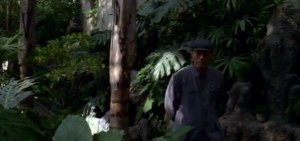
This photo is a screenshot from the film “The Last Emperor.” In this photo, the former Emperor of China, Puyi, is now a Chinese citizen and a gardener. Throughout the film Puyi’s status and identity has been translated to the audience through his costume. Through elements of mise-en-scene, color and formation regarding Puyi’s outfit, the filmmakers argue that in order for Puyi to come to find his own identity, he has to remove himself from political, social and economic affiliations. good point
In the prior scene, Puyi is released from prison and granted citizenship in the Peoples Republic of China. The next scene cuts to Puyi working in the garden, and in the screenshot I selected, we see Puyi walking in the garden. The garden itself is lush, green and full of life, which is contrasted by Puyi’s all grey Mao Suit. I interpreted this scene as the garden represented Puyi’s inner self that isn’t represented by his costume. Puyi finally feels tranquil and at peace, as seen in the tranquility of the garden. This is paralleled by the outward representation of lack of color in Puyi’s costume. Although the filmmakers wanted to contrast Puyi’s costume with his surroundings, in this screenshot Puyi almost appears apart of the background. The filmmakers wanted to emphasize that Puyi’s true internal identity is not represented by his many different costumes, but instead comes from him being at peace with his external surroundings.
The Mao Suit that Puyi wears in this scene is grey and also lacks the armband and book that is seen with the Red Guards of the following scene. In Mao’s China, the traditional Mao Suit was either grey or blue. The filmmakers chose to use a grey suit to further disconnect Puyi from a class hierarchy. By choosing grey over blue, the filmmakers also further emphasize the plainness and lack of color displayed by the suit. The filmmakers choice to dress Puyi in a colorless, plain Mao suit was in effort to strip any sort of identification recognizable from an external viewpoint. This furthers the message of internal identity as opposed to a costume determining Puyi’s identity for him.
The Mao Suit that Puyi wears is also restrictive when compared to the flowing nature of the Imperial robes he wore when he was a child Emperor. The restrictive nature of the Mao Suit is a symbol of the lack of control Puyi now has over external instances. However, the flowing robes Puyi wore as a child allowed for movement demonstrating the free-flowing ability ??? the child had over his surroundings. Puyi’s inability to control the issues around him, as represented by the Mao suit, further demonstrate the focus on internal understanding of identity.
The all grey, formfitting Mao Suit worn by Puyi in this scene struggles to show any political, economic or social denotations. However, it is only in these final scenes where Puyi is able to feel at peace with his own identity. This shows that the filmmakers wanted to emphasize that true identity comes from within. This could also be seen as a Western criticism of both Imperial and Communist China, seeing as the Puyi only found peace when he wasn’t affiliated with either of them.
detailed reading of the grey Mao suite and Puyi’s inner identity
